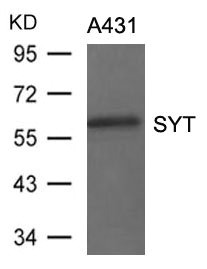SS18 Antibody
-
货号:CSB-PA173100
-
规格:¥2024
-
图片:
-
其他:
产品详情
-
产品名称:Rabbit anti-Homo sapiens (Human) SS18 Polyclonal antibody
-
Uniprot No.:Q15532
-
基因名:SS18
-
宿主:Rabbit
-
反应种属:Human,Mouse,Rat
-
免疫原:Peptide sequence around aa.14~18(G-E-I-T-P) derived from Human SYT.
-
免疫原种属:Homo sapiens (Human)
-
克隆类型:Polyclonal
-
纯化方式:Antibodies were produced by immunizing rabbits with synthetic peptide and KLH conjugates. Antibodies were purified by affinity-chromatography using epitope-specific peptide.
-
浓度:It differs from different batches. Please contact us to confirm it.
-
产品提供形式:Liquid
-
应用范围:ELISA,WB
-
推荐稀释比:
Application Recommended Dilution WB 1:500-1:1000 -
Protocols:
-
储存条件:Upon receipt, store at -20°C or -80°C. Avoid repeated freeze.
-
货期:Basically, we can dispatch the products out in 1-3 working days after receiving your orders. Delivery time maybe differs from different purchasing way or location, please kindly consult your local distributors for specific delivery time.
相关产品
靶点详情
-
功能:Appears to function synergistically with RBM14 as a transcriptional coactivator. Isoform 1 and isoform 2 function in nuclear receptor coactivation. Isoform 1 and isoform 2 function in general transcriptional coactivation. Component of SWI/SNF chromatin remodeling subcomplex GBAF that carries out key enzymatic activities, changing chromatin structure by altering DNA-histone contacts within a nucleosome in an ATP-dependent manner.
-
基因功能参考文献:
- Thirty-four patients (20 males and 14 females, mean of 31years) with SS18-SSX fusion-positive SS-HN were identified. The parapharyngeal region of the neck was the most common site PMID: 28249647
- Kidney transplant recipients' polymorphisms of genes associated with telomere length, BICD1 and chromosome 18, but not hTERT, affect kidney allograft early and long-term function after transplantation. PMID: 27496426
- Case Report: bronchial biphasic synovial sarcoma with SS18 gene rearrangement. PMID: 24429587
- SYT gene split is associated with Synovial sarcoma. PMID: 24922679
- SS18-SSX fusion type is a significant prognostic factor for patients with synovial sarcoma. PMID: 24022186
- Studies show that in the 2 synovial sarcoma cell lines used, the fusion of SS18 with SSX leads to assembly of aberrant BAF complexes that become targeted to the Sox2 locus, with loss of repressive H3K27me3 marks, driving Sox2 expression and proliferation of these cells. PMID: 23540691
- SYT-SSX2 was recruited to distinct loci across all chromosomes, and an overwhelming number of Polycomb-modified sites enriched with the trimethylated histone H3 on lysine 27 (H3K27me3) formed the main recruiting module for SYT-SSX2. PMID: 22594313
- SS18-SSX1 and SS18-SSX2 variant translocations are associated with synovial sarcoma. PMID: 22976541
- the initial events that likely occur when SYT-SSX2 is first expressed, and its dominant function in subverting the nuclear program of the stem cell, leading to its aberrant differentiation, as a first step toward transformation. PMID: 21996728
- SS18 together with animal-specific factors defines human BAF-type SWI/SNF complexes PMID: 22442726
- the fusion gene SYT-SSX should be considered to play important role on Synovial sarcoma cell growth via ERK pathway PMID: 21234732
- Rearranged SYT wasdetected in all synovial sarcomas but not in any Ewing sarcoma/primitive neuroectodermal tumors PMID: 20660338
- The SYT protein has a unique QPGY domain, which is also present in the largest subunits, p250 and the newly identified homolog p250R, of the corresponding SNF/SWI complexes PMID: 11734557
- coexistence of fusions with SSX1 and SSX2 in synovial sarcomas PMID: 12037676
- SYT may function as a general coactivator PMID: 15919756
- demonstrate differentially expressed genes for the 2 major gene fusion variants in SS, SS18/X breakpoint 1 sarcoma (SSX1) and SS18/SSX2, and thereby suggest that these result in different downstream effects PMID: 16152617
- SYT interacts with SYT-interacting protein/co-activator activator PMID: 16227627
- SYT-SSX2 contributes to tumor development, in part through beta-catenin signaling. PMID: 16462762
- SS18 and SS18L1 genes map within co-linear DNA segments that may have evolved through a relatively recent genomic duplication event. PMID: 16484776
- The SS18-SSX2 fusion protein may act as a so-called transcriptional "activator-repressor," which induces downstream target gene deregulation through epigenetic mechanisms. PMID: 17018603
- SYT-SSX1 fusion protein directly down-regulated the expression of COM1, a regulator of cell proliferation. PMID: 17101797
- endogenous LHX4 binds to the CGA promoter and that LHX4-mediated CGA activation is enhanced by the SS18-SSX protein PMID: 17667940
- this sarcoma showed a longer-than-expected PCR product. Direct sequencing of the product disclosed a novel SYT/SSX1 fusion transcript. PMID: 17721327
- SS18-SSX1 can negatively regulate p53 tumor-suppressive function by increasing the stability of its negative regulator HDM2. PMID: 18234968
- Findings showing a complex cryptic rearrangement that gives rise to the characteristic SYT-SSX2 fusion gene in a monophasic synovial sarcoma patient. PMID: 18992642
- SYT-SSX fusion type was not correlated with survival synovial sarcoma. PMID: 18997619
- provides evidence that, in the appropriate context, expression of the SYT-SSX2 oncogene leads to loss of polycomb function PMID: 19337376
- SYT-SSX1 is an adverse predictor for disease-specific survival and metastasis-free survival, but has no relation to local recurrence-free survival in synovial sarcoma. PMID: 19385976
- findings indicate that cytoplasmic SYT isoforms interact with actin filaments and function in the ability cells to bind and react to specific extracellular matrices PMID: 19649286
显示更多
收起更多
-
相关疾病:A chromosomal aberration involving SS18 may be a cause of synovial sarcoma. Translocation t(X;18)(p11.2;q11.2). The translocation is specifically found in more than 80% of synovial sarcoma. The fusion products SSXT-SSX1 or SSXT-SSX2 are probably responsible for transforming activity. Heterogeneity in the position of the breakpoint can occur (low frequency).
-
亚细胞定位:Nucleus.
-
蛋白家族:SS18 family
-
组织特异性:Fairly ubiquitously expressed. Expressed in synovial sarcomas and in other human cell lines. The fusion genes SSXT-SSX1 and SSXT-SSX2 are expressed only in synovial sarcomas.
-
数据库链接:
HGNC: 11340
OMIM: 600192
KEGG: hsa:6760
STRING: 9606.ENSP00000414516
UniGene: Hs.129261
Most popular with customers
-
-
YWHAB Recombinant Monoclonal Antibody
Applications: ELISA, WB, IF, FC
Species Reactivity: Human, Mouse, Rat
-
Phospho-YAP1 (S127) Recombinant Monoclonal Antibody
Applications: ELISA, WB, IHC
Species Reactivity: Human
-
-
-
-
-





















